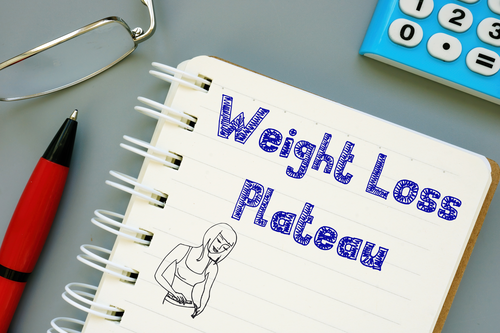Weight loss plateaus can be one of the most annoying things about getting healthy. After weeks or months of progress, the scale just stops moving even though you’re eating the same and exercising the same. It’s enough to make you feel discouraged and not know what to do next. But plateaus are an expected part of the weight loss journey. Recognizing weight loss progress beyond just the scale is crucial for maintaining motivation and realistic goals.
In this blog, we’ll explain the reasons behind weight loss plateaus, provide practical tips for overcoming them, and highlight how our Mediterranean Paleo meal plans can help you break through plateaus and achieve lasting success on your weight loss journey.
What is a Weight Loss Plateau?
A weight loss plateau is when you stop losing weight even though you’re eating the same and exercising the same. This can be frustrating especially after you’ve made so much progress. During a plateau, your body seems to resist further weight loss and you feel discouraged.
The main concept behind a weight loss plateau is the balance of calories in vs calories out. When you start losing weight, your body needs fewer calories to maintain your new body weight. This change can lead to a situation where the same caloric intake that once caused weight loss now only maintains your current weight. Essentially your body adapts to the lower caloric intake and you stall out.
Causes of Weight Loss Plateaus
Understanding the reasons behind weight loss plateaus is key to anyone on a weight loss journey. Several things can cause these stalls and knowing what they are can help you adjust. One crucial factor is body weight homeostasis, which involves complex biological and metabolic processes that regulate body weight.
Caloric Balance: What Happens to Calorie Requirements When You Lose Weight
As you lose weight your body needs fewer calories to function. This is because you have less body mass and your basal metabolic rate (BMR) goes down. If you continue to eat the same number of calories as before you may find your weight loss slows or stops. Adjusting your calorie intake is key to maintaining a calorie deficit and losing weight. This adjustment is crucial for maintaining lost weight, especially during weight loss plateaus.
Metabolic Adaptation: The Body Becomes More Efficient at Burning Calories
When you lose weight your body goes through metabolic adaptation. This means it becomes more efficient at using energy which can lead to fewer calories being burned during daily activities and exercise. As a result, your body may burn fewer calories than it did at a higher weight and it’s harder to lose weight. To combat this try changing up your exercise routine or increasing the intensity of your workouts. Understanding body weight homeostasis is crucial to developing effective strategies for weight loss and maintenance.
Set Point Theory: The Body’s Natural Weight Range and Resistance to Weight Loss
Set point theory says your body has a natural weight range it wants to maintain. When you lose weight your body may resist further loss by adjusting hormones and metabolism to get back to that set point. This can be a frustrating cycle where weight loss gets harder and harder. Knowing this can help you stay motivated and realize plateaus are part of the process. Periods of weight maintenance are crucial during the weight loss journey, allowing your body time to adapt and making long-term weight management more sustainable.
Hormonal Changes: Ghrelin and Leptin’s Role in Hunger and Metabolism
Hormones control hunger and metabolism. Ghrelin is often called the “hunger hormone” and increases appetite. Leptin helps signal fullness. When you lose weight leptin levels decrease and ghrelin levels may increase and you feel hungrier. This hormonal shift makes it harder to maintain a calorie deficit and contributes to weight loss plateaus. Knowing this can help you develop strategies to manage hunger and stay on track with your weight loss goals.
Symptoms and Indicators
Knowing a weight loss plateau is key to anyone on a weight loss journey. When progress stalls it can be frustrating and demotivating. Here are the indicators to help you know when you might be at a plateau. Understanding that maintaining weight loss during these times is crucial for long-term success.
When Weight Loss Slows Down or Stops
One of the first signs of a weight loss plateau is a noticeable slowdown. If you’ve been losing weight consistently and suddenly your weight remains the same for several weeks it’s likely you’re in a plateau. Tracking your weight weekly can help you see this trend. Remember fluctuations are normal but a consistent lack of change is a sign to reassess your approach.
Hunger and Fatigue as Indicators of a Plateau
Another sign may be increased hunger or fatigue. As your body adjusts to a lower calorie intake it can lead to increased hunger signals. This is often due to metabolic adaptation where your body becomes more efficient at conserving energy. If you find yourself hungrier than normal or fatigued during exercise these could be signs your body is in homeostasis and resisting weight loss.
Muscle Loss vs Fat Loss
It’s important to distinguish between muscle loss and fat loss during a plateau. If you’re exercising regularly and not seeing changes on the scale you might be gaining muscle while losing fat. This is common especially if you’ve added strength training to your routine. Using body composition measurements like body fat percentage can give you a clearer picture of your progress. If you’re losing muscle mass instead it’s time to reassess your calorie intake and exercise routine to make sure you’re promoting fat loss while preserving muscle.
How to Overcome Weight Loss Plateaus
A weight loss plateau can be frustrating but there are several strategies to help you get back on track. Knowing how to adjust your approach can make a big difference in your weight loss journey. It’s important to recognize your weight loss progress and understand that improvements in overall health go beyond just the scale.
Adjust Calorie Intake
To maintain a calorie deficit try recalibrating your calorie intake. As you lose weight your body needs fewer calories. Tracking your daily calorie intake can help you identify where you might be consuming extra calories. Reduce your intake by a small amount and you’ll get back on track.
Change Exercise Routine
Changing your exercise routine is another way. Increasing the intensity, duration, or type of exercise can kickstart your metabolism. Adding strength training can also help increase muscle mass which in turn can increase your basal metabolic rate. This change can help your body burn more calories at rest.
Monitor and Adjust Eating Habits
Keeping a food diary or using a tracking app can give you insight into your eating habits. By monitoring what you eat you may find patterns or habits that are causing weight gain or maintenance. Adjusting portion sizes or swapping high-calorie foods for healthier options can help you lose more weight.
Sleep and Reduce Stress
Sleep and stress levels are crucial for weight loss. Lack of sleep can lead to increased hunger and cravings while stress can trigger emotional eating. Prioritize quality sleep and try stress reduction techniques like meditation or yoga to regulate your appetite and support your weight loss.
Increase Fiber Intake
Adding more fiber to your diet is good for digestion and appetite control. Foods high in fiber like fruits, vegetables, whole grains, and legumes can make you feel fuller for longer. This can prevent overeating help you maintain a calorie deficit and support your weight loss.
By doing these you can get past weight loss plateaus and reach your goals. Remember persistence is key and small changes can lead to big results.
Psychological and Behavioral Aspects
Understanding the psychological and behavioral aspects of weight loss is key to long-term success and navigating plateaus.
Set Realistic Expectations
Weight loss plateaus can be frustrating but it’s important to remember that they are a normal part of the process. Many people experience fluctuations in their weight loss journey. Setting realistic expectations can help you stay motivated. Remember achieving your weight loss goal is not always a straight path. Recognize that plateaus happen to most people and it will lessen the feeling of discouragement. It’s important to see these periods as a temporary phase, not a failure.
Get Professional Help
Consulting with experts can be a big help when you hit a weight loss plateau. Registered dietitians and fitness professionals can give you personalized advice tailored to your needs. They can analyze your current eating habits and exercise routine and help you make changes. Professional guidance can also give you emotional support which is important during tough times. Having a team behind you can make a big difference in overcoming obstacles and achieving sustainable results.
Overall Health
When you hit a weight loss plateau remember progress isn’t just measured by the scale. Focus on overall health improvements can give you motivation and perspective during these times.
Focus on Health Improvements
Even if the number on the scale isn’t moving, other health metrics will show improvements. You may notice improvements in your energy levels, sleep quality, and mood. Regular exercise can also improve cardiovascular fitness and increase muscle mass. These changes contribute to your overall well-being and can make you feel better even if the weight loss isn’t as fast as you want.
Sustainable Weight Loss
Sustainable weight loss is about creating habits that last. Quick fixes lead to yo-yo dieting which is bad for physical and mental health. By focusing on long-term health goals rather than just losing weight you will build a foundation for weight loss. This means eating a balanced diet with whole foods, exercising regularly, and having a healthy relationship with food.
Struggling With Weight Loss Plateaus? Upstate Weight Loss Solutions Can Help!
If you’re struggling with a weight loss plateau and need personalized support, our team at Upstate Weight Loss Solutions is here to help. With expert guidance and customized meal plans, we can provide the tools you need to overcome plateaus and reach your goals.
Contact us at (864) 514-6463 for more information today!





